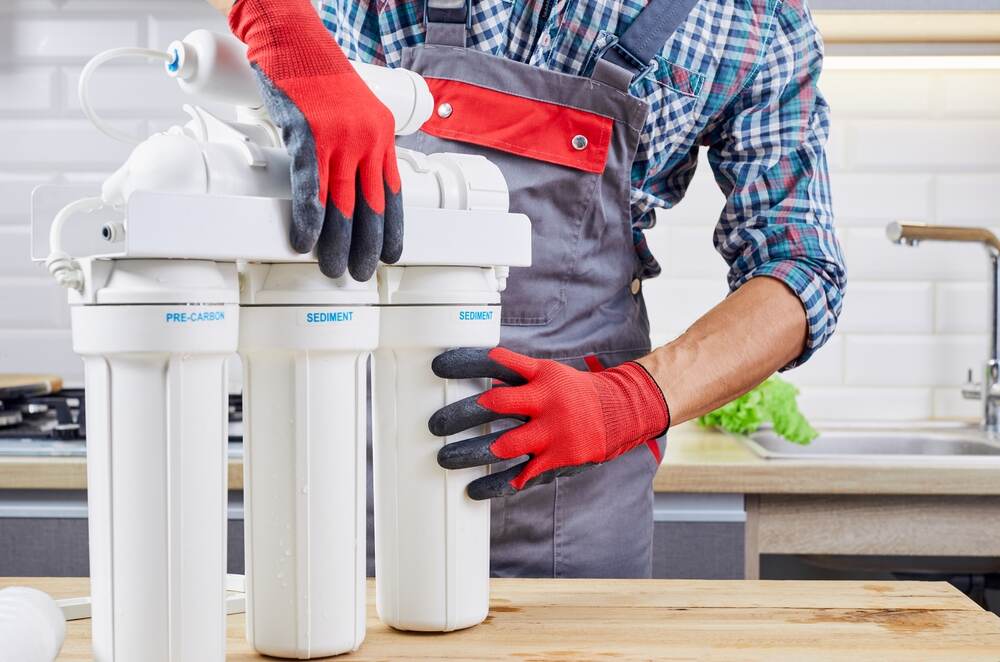
Choosing the best water filtration system for your home can be challenging, mainly because multiple options exist. While most of the water we drink, wash, and cook has already been treated through a filter before it reaches us, it can be beneficial to filter it again to ensure the water is as clean as possible.
Water filters can not only remove some chemicals from your tap water but can also help enhance the overall smell, taste, and appearance of your water. Whether you are trying to improve the softness of your water or clean your drinking water even further, it is essential to know which water filtration system is best.
What Is the Most Effective Water Filtration Method: How Does a Water Filtration System Work?
Different types of water filtration systems are all excellent at filtering your water, but some filters are better at certain things than others. For example, one filter might be best to purify your water to drink, while another may be best for keeping sediment out of your water. These are some of the best water filtration systems your plumber can install.
Reverse Osmosis
Reverse Osmosis is a water filtration process that removes ions, large particles, and unwanted molecules from your drinking water using a partially permeable membrane. This is a highly effective way of purifying your water, as it is typically combined with a mechanical filter or absorption filter to help purify the water even further.
It uses pressure to force water through the membrane, so it doesn’t need electricity. However, some wastewater gets sent back down the drain. Since there are additional filters involved with reverse osmosis, this water filtration system can cost more than others, but it offers some of the best filtration possible.
Mechanical Filters
Using a barrier, a mechanical water filter removes any dirt, sediment, or particles in your water. The barrier can be a mesh or ceramic filter, which filters out debris in your water, keeping the sediment or debris in the filter.
Mechanical filters are often given micron ratings, which help indicate how effective they are and how much sediment the filter can remove. A 5-micron rating can remove the most clear particles for you to see. A 1-micron rating means the filter will remove particles you cannot see, and a .5-micron rating means it can remove cysts.
Absorption Filters
Absorption filters are highly effective in removing waterborne contaminants from your water, making it a good choice for purifying water to drink. Absorption is typically carried out by carbon and can easily trap chemical impurities, such as chlorine, in the water.
Most absorption filters contain granular activated carbon, which helps remove smells or odd tastes in the water. Still, more expensive absorption filters use carbon block elements to block even more impurities.
Ion Exchange Filters
Ion exchange filters help soften your water but do not necessarily filter it. They use electronically charged solids to remove contaminant ions from the water and replace them with sodium or hydrogen ions.
The ion exchange filters only remove hard minerals, which makes it best for areas where the water temperature is typically high, like commercial coffee machines. This water filtration system maintenance is easy; you just need to replace the filter periodically.
Sequestration
Sequestration is when a substance is chemically isolated. In scale-inhibiting filters, food-grade polyphosphate is often used to sequester calcium and magnesium minerals, which can cause corrosion and limescale.
The polyphosphate is introduced in small amounts and does not eradicate the scale. The sequestration water filtration method keeps the minerals within the solution so they do not form on any surfaces they come into contact with. This is best used if your water is alkaline or hard.
Which Water Filtration System Removes the Most Contaminants?
Reverse Osmosis systems remove the most contaminants from your water, making it safe for you to use for multiple purposes, including drinking. The cost of a whole house water filtration system using Reverse Osmosis typically costs between $1,000 and $5,000, but it can be as much as $10,000 depending on the size of your home.
Which Is Better: Reverse Osmosis or Filtration?
The water we use for cooking, bathing, and drinking should be filtered to ensure no harmful chemicals. Whole-house filtration systems can be great for removing specific contaminants in your water, but Reverse Osmosis is the best for water filtration. With Reverse Osmosis, your water will be filtered to remove any chemical contaminants, such as metal ions or aqueous salts.
Is Whole House Filtration Worth It?
A whole-house water filtration system is a significant investment but has many benefits. If you decide to choose a water filtration system for your home, you will have peace of mind knowing that your water is safe to drink and can be safely used for other purposes.
Final Thoughts
While a water filtration system might be a significant investment, it is worth it, as it provides your home with clean water for drinking, bathing, cooking, and more. If you decide to install a water filtration system for your home, Beach Plumbing can help.
Contact Beach Plumbing today to plan your water filtration system installation.
